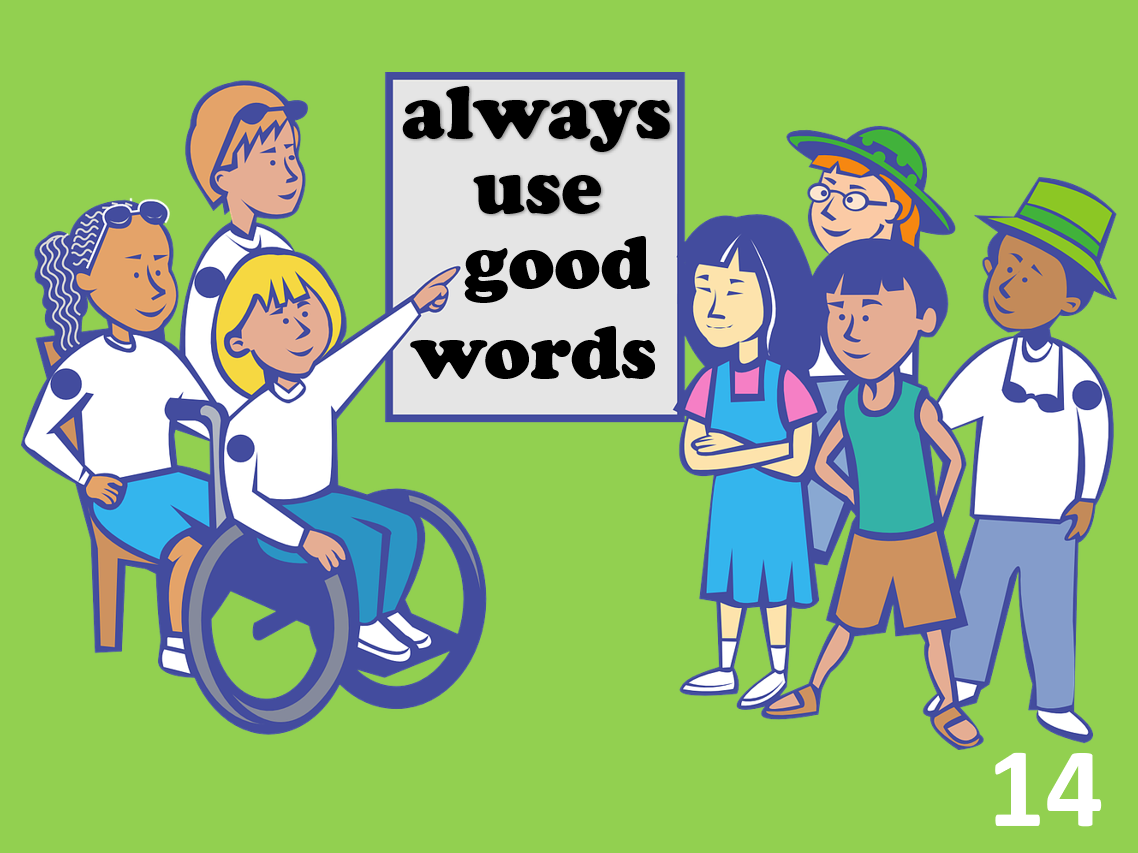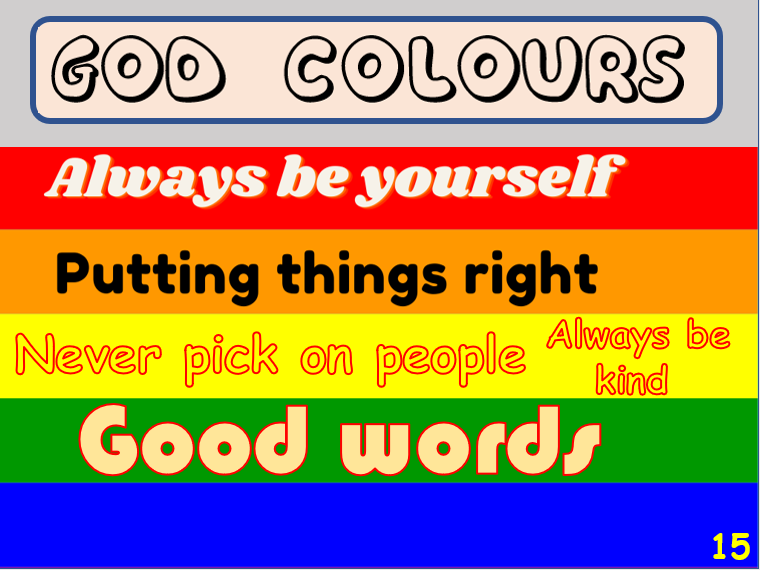Home > Teaching > Themed Series > ‘God Colours’ Intro > Week 1 > Week 2 > Week 3 > Week 4 ‘Good Words’
‘God Colours’ series - Week 4
‘Good Words’
For Leaders:
Ephesians 4 v 29 “Let no unwholesome word come out of your mouth, but such a word as is good for edification according to the need of the moment, so that it will give grace to those who hear.”
There is a set of PowerPoint slides for week 4 to accompany the lead-in session drama and this week’s teaching material.
PowerPoint, Leaders’ notes and other items downloadable from the bottom of this webpage.
This week in ‘God Colours’ we are looking at the way God would want us to speak to one another. Jesus said that we should not swear by heaven or earth but keep our yes as yes and no as no. Paul writes, “That no unwholesome word should come from our mouths.’ We don’t need to add or use strong language or bad words, simply speak straightforwardly and kindly. In proverbs it says that we should not use harsh words because these only stir up trouble.
SLIDE 1 – ‘God Colours’ series theme slide
This slide includes our previous three ‘God Colours’ You might like to ask the children what they can remember about last week’s ‘Never pick on people, always be kind’ theme.
Hey kids remember we are talking about how God wants us to help Him paint the world with His special colours ‘God Colours’. God’s colours are not just the beautiful colours we see around us, but also the good things that God wants everyone to see and know, including love, joy, peace and kindness.
SLIDE 2 - Well one of the things God wants us to do is to use ‘good words, kind words, helpful words. So tonight’s God Colour is ‘Good Words.’
PART 1 - LEAD-IN SESSION Drama
For Leaders:
This evening’s drama is centred around someone who asks various people the same question and gets very different responses. The responses include someone being mildly abusive / annoyed at being asked, someone who just can’t be bothered or polite enough to pay attention and answer, and two people who answer straight forwardly ‘no’ and ‘yes’ with a polite follow up. The purpose of this intro is to open up the evening’s theme of how we should be kind, polite and responsive in our conversation with other people.
Parts and props
Question person - QP
Answer person A1 - Digging a hole with shovel and wearing hi viz jacket.
Answer person A2 - Cleaning windows with a bucket and sponge.
Answer person A3 - Sweeping with a broom.
Answer person A4 - Sitting on a seat reading a paper
drama - yes and no
All four of the answer people A1 - A4 walk onto the stage, two from the right-hand side steps and two from the left. They begin their activities. Shortly afterwards the ‘question person’ ‘QP’ follows them onto the platform.
QP approaches A1 who is digging a hole and politely asks them if they know the way to Bankside.
QP: Oh hello there, sorry to bother you but I’m a little lost and wondered if you might know the direction I need to go to get to Bankside?
A1: (looking somewhat annoyed and answering rather abruptly) Hey, I’ve got enough to do here without being interrupted by people asking for directions and I’m not from these parts anyway!
QP: (standing back and rather shocked by the response of A1) Oh dear, I better try someone else
QP: (Approaches A2)
A2: (Cleaning windows and trying to ignore QP as if they’ve not seen them)
QP: (carefully approaching A2) Oh hello there, sorry to bother you but I’m a little lost and wondered if you might know the direction I need to go to get to Bankside?
A2: (not really focussing or having eye contact with QP) No idea, you’ll have to speak to someone else!
QP: Oh dear, these people don’t seem too friendly.
QP: (approaches A3 who is sweeping the floor) Oh hello there, sorry to bother you but I’m a little lost and wondered if you might know the direction I need to go to get to Bankside?
A3: (Leaning on broom with a smile on their face) Oh, I’m sorry to hear you are lost. No I am afraid I can’t help you but I hope you’ll find someone who can.
QP: Thank you, I hope so too.
QP: (Approaches A4 who is sitting reading the paper- speaking quietly to themselves) I do hope someone can help me.
QP: Oh, hello there, sorry to bother you but I’m a little lost and wondered if you might know the direction I need to go to get to Bankside?
A4: (dropping their paper) Oh hi, yes, I think I can help you there. (A4 points to direct QP)
QP: Thank you so much I really appreciate your help.
The characters leave the stage.
Kids what did you make of the way the characters answered the person needing help? (Let the kid’s feedback)
(SLIDE 3) A simple yes or no would have been nicer that the way the first two people replied. We’ll talk more about words we use later.
PART 2 - BIBLE CHAT (LISTEN-UP TIME – SLIDE 4)
‘Good Words’
For Leaders:
Ephesians 4 v 29 “Let no unwholesome word come out of your mouth, but such a word as is good for edification according to the need of the moment, so that it will give grace to those who hear.”
Props: Some kind of board to which you can attach (or write on) particular words used in this chat. PowerPoint slides also used. A mix of both slides and board use adds interest for the children, all with the aim of bringing this chat alive on the use of words from a Christian / Biblical perspective.
Chat:
Put SLIDE 5 up to remind kids of this session’s theme
SLIDE 6 - (Put one or two common words onto the board. Then Put a difficult word on the board, see if any of the kids know what it means. Could use the simple words - ‘thing’ and ‘higher’ something a little difficult - circumference )
Kids what do you think the most commonly used word in the English language is? (Take answers) Well the most commonly used word is the word ‘the’. The 100th most commonly used word is ‘us’.
SLIDE 7 - There are approximately a massive 171,475 words in the English language that are in use
SLIDE 8 - Typically a person will use 7,000 words in a day and many people more than that.
SLIDE 9 - The average person speaks between 100 - 130 words per minute. Wow! Can you believe that?
The words we speak say something about us as a person. One of the biggest choices we make each day is the words we use.
SLIDE 10 - The words we choose to use are important. Words can be helpful, they can cheer people up, they can be friendly, positive, comforting, funny, kind, nice and encouraging. A few words spoken in kindness can make a whole difference to someone’s day. “It’s so nice to see you”, “how are you?” “good morning”.
SLIDE 11 - Words can also be cruel and hurtful. The wrong words can spoil someone’s day and words can be upsetting. (Hold up your Bible) Paul in the New Testament part of the Bible writes that we should not let anything come from our mouths that is unhelpful, unkind, offensive, not nice to people, or lies.
SLIDE 12 - Words can cause trouble, wind people up, even make people angry. Sometimes people use God’s name, or, Jesus’ name as a swear word, or worse. Words spoken in temper can be very damaging. We don’t need to use strong language or bad words to make a point, instead simply speak straightforwardly and kindly. In the Bible it says that we should not use harsh words because these only stir up trouble.
SLIDE 13 - But words are wonderful - we should always try to speak in a good way. And if we say something wrong or offend someone, we should quickly say sorry.
(Hold your Bible up again) Also in the New Testament part of the Bible we read (Philippians 4 verses 8-9) that we should reflect on what is true, lovely, clean, pure, good. (Put these words on the board)
SLIDE 14 - It’s not always easy to get things right, especially when we’re annoyed, but Jesus wants to help us. And when we make a mistake and say sorry to Jesus He’s always right there to forgive us. Remember we can always pray to Jesus asking for His help.
So, kids, let’s always use GOOD WORDS!
SLIDE 15 - God Colours theme slide including ‘Good words’. Just one left I wonder what it might be?
PART 3
RESPONSE TIME (SMALL GROUPS IF POSSIBLE)
How might we encourage someone with our words? (Kind greeting - hello how are you? Telling them you hope they have a lovely day..,)
Ask the children if they know what it means to compliment someone. (To say something nice about someone)
Ask the children to think about how they might compliment someone over the weekend. (Let them talk about their ideas)
Week 4 DOWNLOADS
Week 4 Lead-in Drama, Bible Chat and Response Time Leaders’ Notes
Week 4 PowerPoint slides

















